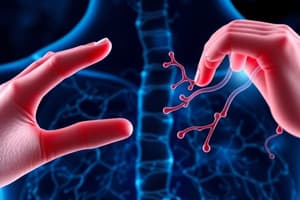Podcast
Questions and Answers
Which type of hormone is primarily responsible for regulating metabolism and promoting glucose uptake in target cells?
Which type of hormone is primarily responsible for regulating metabolism and promoting glucose uptake in target cells?
- Testosterone
- Thyroid hormone
- Cortisol
- Insulin (correct)
What is the primary cause of Type 1 Diabetes Mellitus?
What is the primary cause of Type 1 Diabetes Mellitus?
- Inadequate glucagon production
- Insulin resistance
- Genetic predisposition to insulin production
- Autoimmune destruction of beta cells (correct)
What is the key feedback mechanism that enhances hormone production during childbirth?
What is the key feedback mechanism that enhances hormone production during childbirth?
- Paracrine signaling
- Negative feedback
- Positive feedback (correct)
- Homeostatic control
What condition results from excessive production of thyroid hormones?
What condition results from excessive production of thyroid hormones?
During which phase of the ovarian cycle does follicle maturation occur?
During which phase of the ovarian cycle does follicle maturation occur?
What is the primary effect of glucagon in the body?
What is the primary effect of glucagon in the body?
Which of the following hormone disturbances would most likely lead to Addison's disease?
Which of the following hormone disturbances would most likely lead to Addison's disease?
What is the role of leptin in the body?
What is the role of leptin in the body?
Flashcards are hidden until you start studying
Study Notes
Hormonal Regulation
- Hormones: Chemical messengers secreted by glands into the bloodstream.
- Types of Hormones:
- Peptide hormones (e.g., insulin)
- Steroid hormones (e.g., cortisol)
- Amino acid derivatives (e.g., thyroid hormones)
- Mechanisms of Action:
- Bind to specific receptors on target cells.
- Activate signal transduction pathways (e.g., second messengers).
- Feedback Mechanisms:
- Negative feedback: Inhibits hormone production (e.g., insulin and glucose).
- Positive feedback: Enhances hormone production (e.g., oxytocin during childbirth).
Endocrine Disorders
- Diabetes Mellitus:
- Type 1: Autoimmune destruction of insulin-producing beta cells.
- Type 2: Insulin resistance and eventual beta cell dysfunction.
- Thyroid Disorders:
- Hypothyroidism: Underproduction of thyroid hormones leading to fatigue, weight gain.
- Hyperthyroidism: Overproduction of thyroid hormones causing weight loss, anxiety.
- Adrenal Disorders:
- Cushing's syndrome: Excess cortisol leading to weight gain, skin changes.
- Addison's disease: Insufficient cortisol production causing fatigue, low blood pressure.
- Pituitary Disorders:
- Acromegaly: Overproduction of growth hormone in adults.
- Hypopituitarism: Decreased hormone production from the pituitary gland.
Metabolism And Energy Balance
- Metabolism: All biochemical processes that occur within the body.
- Anabolism: Building up of molecules (e.g., protein synthesis).
- Catabolism: Breaking down of molecules for energy (e.g., glycolysis).
- Energy Balance:
- Energy intake vs. energy expenditure.
- Positive balance leads to weight gain; negative balance results in weight loss.
- Hormonal Regulation of Metabolism:
- Insulin: Promotes glucose uptake and storage.
- Glucagon: Stimulates glucose release from liver.
- Leptin: Regulates energy balance and reduces hunger.
- Ghrelin: Stimulates appetite.
Reproductive Endocrinology
- Hormonal Regulation of Reproduction:
- Hypothalamus releases GnRH (gonadotropin-releasing hormone).
- Anterior pituitary releases LH (luteinizing hormone) and FSH (follicle-stimulating hormone).
- Ovarian Cycle:
- Follicular phase: Follicle maturation under FSH influence.
- Ovulation: Triggered by a surge in LH.
- Luteal phase: Formation of the corpus luteum, production of progesterone.
- Testosterone Regulation:
- Produced by Leydig cells in response to LH.
- Supports sperm production and secondary sexual characteristics.
- Menstrual Cycle:
- Average length of 28 days; involves hormonal fluctuations leading to menstruation.
Thyroid Function
- Thyroid Gland:
- Produces thyroxine (T4) and triiodothyronine (T3).
- Regulates metabolism, growth, and development.
- Thyroid Hormone Synthesis:
- Requires iodine and thyroglobulin.
- TSH (thyroid-stimulating hormone) regulates hormone release.
- Functions of Thyroid Hormones:
- Increase basal metabolic rate.
- Influence protein synthesis.
- Regulate carbohydrate and lipid metabolism.
- Assessment of Thyroid Function:
- TSH levels: Primary screening test.
- Free T4 and T3 levels: Evaluate thyroid function directly.
Hormonal Regulation
- Hormones act as chemical messengers secreted by glands into the bloodstream, regulating various bodily functions.
- Types of hormones:
- Peptide hormones (e.g., insulin) are made of amino acids and soluble in water.
- Steroid hormones (e.g., cortisol) are lipid-soluble and derived from cholesterol.
- Amino acid derivatives (e.g., thyroid hormones) are synthesized from specific amino acids like tyrosine.
- Mechanisms of hormone action involve binding to specific receptors on target cells, initiating signal transduction pathways such as activating second messengers.
- Feedback mechanisms manage hormone levels:
- Negative feedback mechanisms inhibit hormone production in response to increased levels (e.g., insulin responding to high glucose).
- Positive feedback mechanisms enhance hormone production during specific conditions (e.g., oxytocin levels increase during childbirth).
Endocrine Disorders
- Diabetes Mellitus manifests in two primary forms:
- Type 1 is characterized by autoimmune destruction of insulin-producing beta cells in the pancreas.
- Type 2 involves insulin resistance with eventual dysfunction of beta cells over time.
- Thyroid disorders include:
- Hypothyroidism leads to insufficient production of thyroid hormones, causing symptoms like fatigue and weight gain.
- Hyperthyroidism results from excess hormone production, leading to weight loss and anxiety.
- Adrenal disorders include:
- Cushing's syndrome caused by excess cortisol resulting in weight gain and skin changes.
- Addison's disease marked by insufficient cortisol leading to symptoms like fatigue and low blood pressure.
- Pituitary disorders include:
- Acromegaly from overproduction of growth hormone in adults.
- Hypopituitarism characterized by decreased hormone production from the pituitary gland.
Metabolism and Energy Balance
- Metabolism encompasses all biochemical processes occurring within the body, essential for maintaining life.
- Anabolism refers to the synthesis of complex molecules (e.g., protein synthesis), while catabolism involves the breakdown of molecules to produce energy (e.g., glycolysis).
- Energy balance is determined by comparing energy intake to expenditure:
- A positive energy balance results in weight gain, while a negative balance leads to weight loss.
- Hormonal regulation plays a crucial role in metabolism:
- Insulin facilitates glucose uptake and storage in tissues.
- Glucagon promotes the release of glucose from the liver into the bloodstream.
- Leptin signals satiety and regulates energy balance, reducing hunger.
- Ghrelin stimulates appetite, indicating hunger.
Reproductive Endocrinology
- Hormonal regulation of reproduction begins with the hypothalamus, which releases gonadotropin-releasing hormone (GnRH).
- The anterior pituitary responds by releasing luteinizing hormone (LH) and follicle-stimulating hormone (FSH), vital for reproductive processes.
- The ovarian cycle includes:
- Follicular phase driven by FSH, promoting follicle maturation.
- Ovulation is triggered by a surge in LH levels.
- Luteal phase involves the formation of the corpus luteum, which produces progesterone.
- Testosterone is produced by Leydig cells in response to LH, crucial for sperm production and the development of secondary sexual characteristics.
- The menstrual cycle typically lasts 28 days, characterized by hormonal fluctuations leading to menstruation.
Thyroid Function
- The thyroid gland produces thyroxine (T4) and triiodothyronine (T3), hormones essential for regulating metabolism, growth, and development.
- Synthesis of thyroid hormones requires iodine and thyroglobulin, with thyroid-stimulating hormone (TSH) overseeing hormone release.
- Functions of thyroid hormones include:
- Increasing the basal metabolic rate, influencing overall energy usage.
- Affecting protein synthesis, impacting muscle and tissue development.
- Regulating carbohydrate and lipid metabolism, maintaining energy balance.
- Assessment of thyroid function typically involves:
- Evaluating TSH levels as the primary screening test.
- Measuring free T4 and T3 levels for direct assessment of thyroid function.
Studying That Suits You
Use AI to generate personalized quizzes and flashcards to suit your learning preferences.



